If you’re looking to elevate your awareness then these luxury mindful tools are just the thing. In our pursuit of mindfulness, a curious paradox often emerges. We look to cultivate presence and non-attachment, yet our environment and objects that surround our practice profoundly influence our practice and overall experience. While mindfulness doesn’t require specific tools—the breath is always available, after all—thoughtfully designed objects can significantly enhance our ability to establish and sustain meaningful practices in daily life. It’s just like investing in a quality journal to level up your gratitude practice.
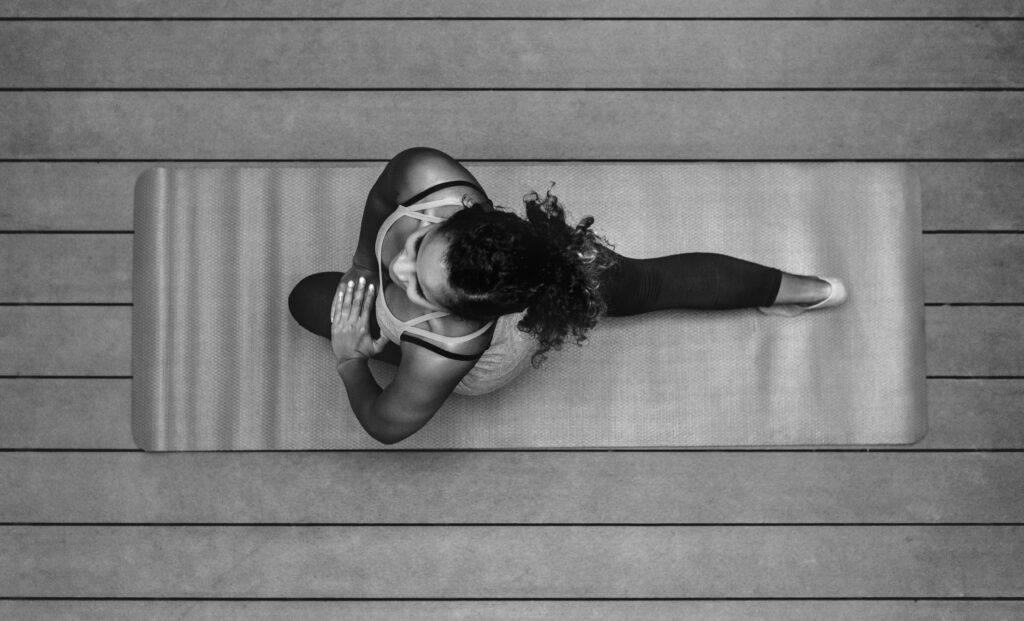
The emerging category of luxury mindfulness tools represents not frivolous indulgence but rather a thoughtful investment in creating a space and conditions that support consistent, deepening practice. Understanding the profound relationship between sensory experience and contemplative states reveals why the quality of our practice tools matters more than we might initially assume.
Table of Contents
The Sensory Foundation of Mindfulness
Neuroscience increasingly confirms what contemplative traditions have long understood: our sensory experience serves as the gateway to present-moment awareness. Each sensory pathway—touch, sight, sound, scent, and taste—offers distinct entry points to mindfulness:
Tactile Awareness
The somatic sense provides our most direct experience of the present moment. When we touch an object with awareness, several processes activate:
- Mechanoreceptors in the skin register precise sensations of texture, temperature, and pressure
- These signals travel via dedicated neural pathways directly to the somatosensory cortex
- The brain creates a detailed map of physical contact, drawing attention to immediate experience
High-quality materials with intentional tactile properties create more distinct and pleasurable sensory signals, making it easier to anchor awareness in physical sensation.
Visual Processing
Visual input significantly influences our mental state through both conscious and unconscious pathways:
- Color perception affects emotional processing via the amygdala and other limbic structures
- Natural patterns and materials activate distinct neural responses compared to synthetic ones
- Visual simplicity or complexity directly impacts cognitive load and attention regulation
Thoughtfully designed meditation tools with refined aesthetics reduce visual distraction while providing gentle anchors for attention.
Auditory Engagement
Sound affects our nervous system directly, bypassing cognitive processing:
- Specific frequencies influence brainwave patterns through entrainment
- Resonant tones stimulate the vagus nerve, activating parasympathetic response
- The acoustic quality of sounds determines their effect on nervous system regulation
Precision-crafted singing bowls, bells, and gongs with pure tonal qualities create more effective sound anchors for practice.
Olfactory Influence
Our sense of smell connects directly to the limbic system, creating powerful associations:
- Specific scents activate distinct neurological patterns linked to memory and emotion
- Certain natural aromatic compounds have demonstrated effects on nervous system regulation
- Olfactory stimuli can bypass conscious thought, creating immediate state changes
Pure, natural incense and essential oils provide cleaner, more effective aromatic support than synthetic alternatives. Check out the spell kits – especially – The Energy Cleansing Kit
The Material Difference: Why Quality Matters in Practice Tools
When we examine the most revered contemplative traditions across cultures, we find a consistent appreciation for refined materials in practice tools. This isn’t about status or display but rather recognition of specific qualities that support deeper practice:
Natural Materials and Nervous System Attunement
Research in environmental psychology demonstrates that natural materials affect our nervous system differently than synthetic ones:
- Wood with visible grain patterns has been shown to lower blood pressure and cortisol levels
- Stone surfaces create temperature and texture variations that enhance sensory awareness
- Unprocessed metals develop unique patinas that evolve with use, supporting non-attachment to permanence
Our bodies evolved in continuous contact with these elements for countless generations, creating inherent recognition and regulation through their presence.
Have a look at some of our sensory objects in the self-love boutique.
Craftsmanship and Intentional Attention
Objects created with focused human attention carry a different energetic quality than mass-produced items:
- The subtle variations in handcrafted pieces naturally draw attention to detail
- The visible evidence of human creation encourages appreciation and presence
- The energy invested in crafting transfers to the experience of using the object
Neuroscience research confirms that our mirror neurons respond differently to objects we perceive as handcrafted versus machine-made.
Precision Engineering and Functional Efficacy
Beyond aesthetics, precisely engineered meditation tools simply work better:
- A perfectly balanced meditation cushion supports longer sitting without discomfort
- Acoustically tuned singing bowls produce cleaner, more resonant tones for sound meditation
- Precisely weighted objects provide more effective proprioceptive feedback for embodiment practices
This functional superiority creates fewer distractions and supports deeper states of concentration.
The Renoo Approach: Mindfulness Tools with Purpose
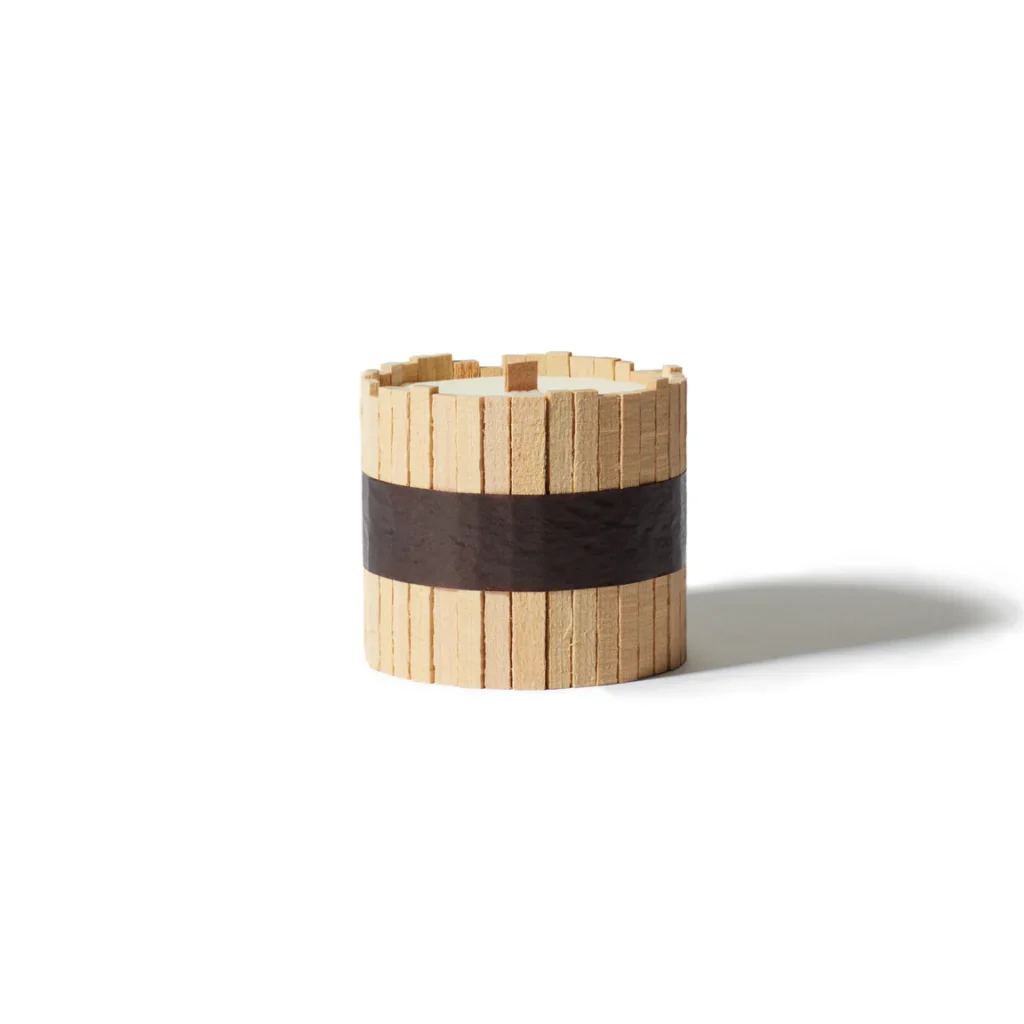
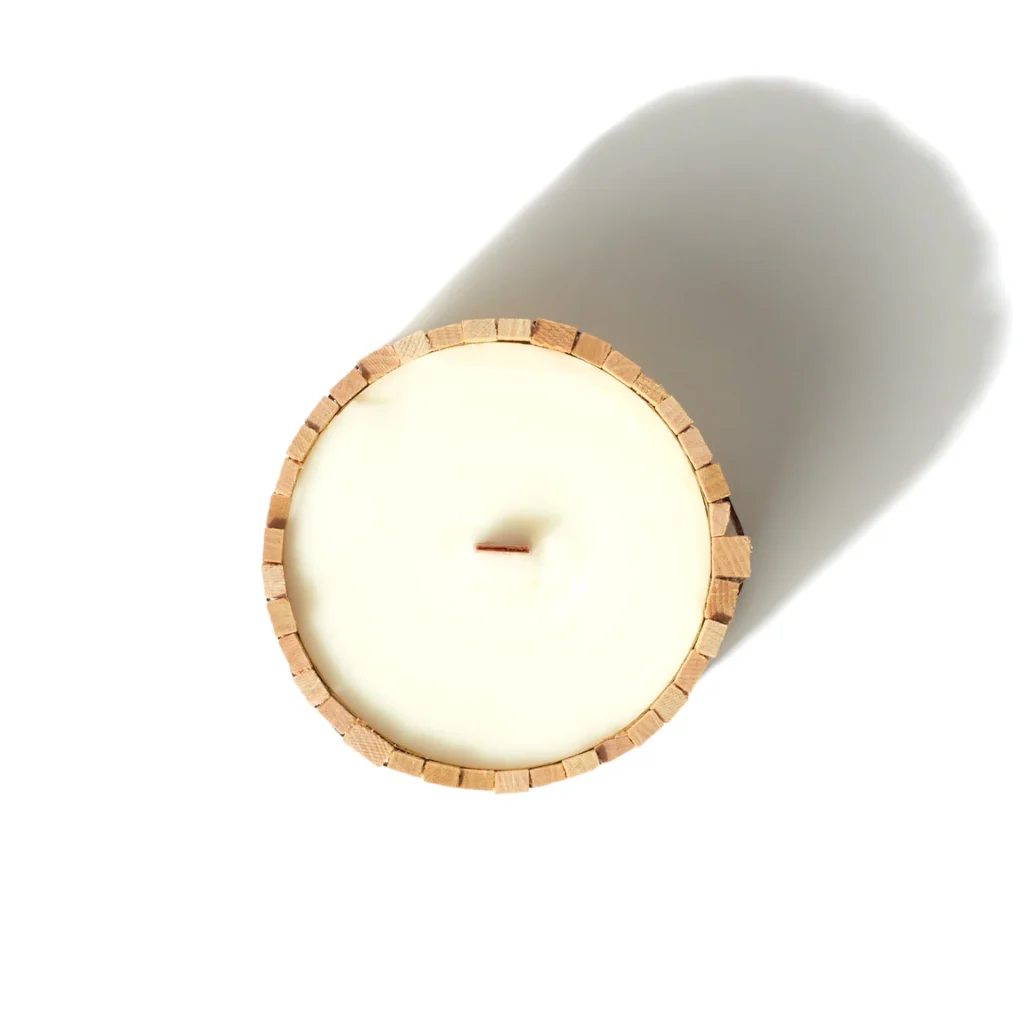
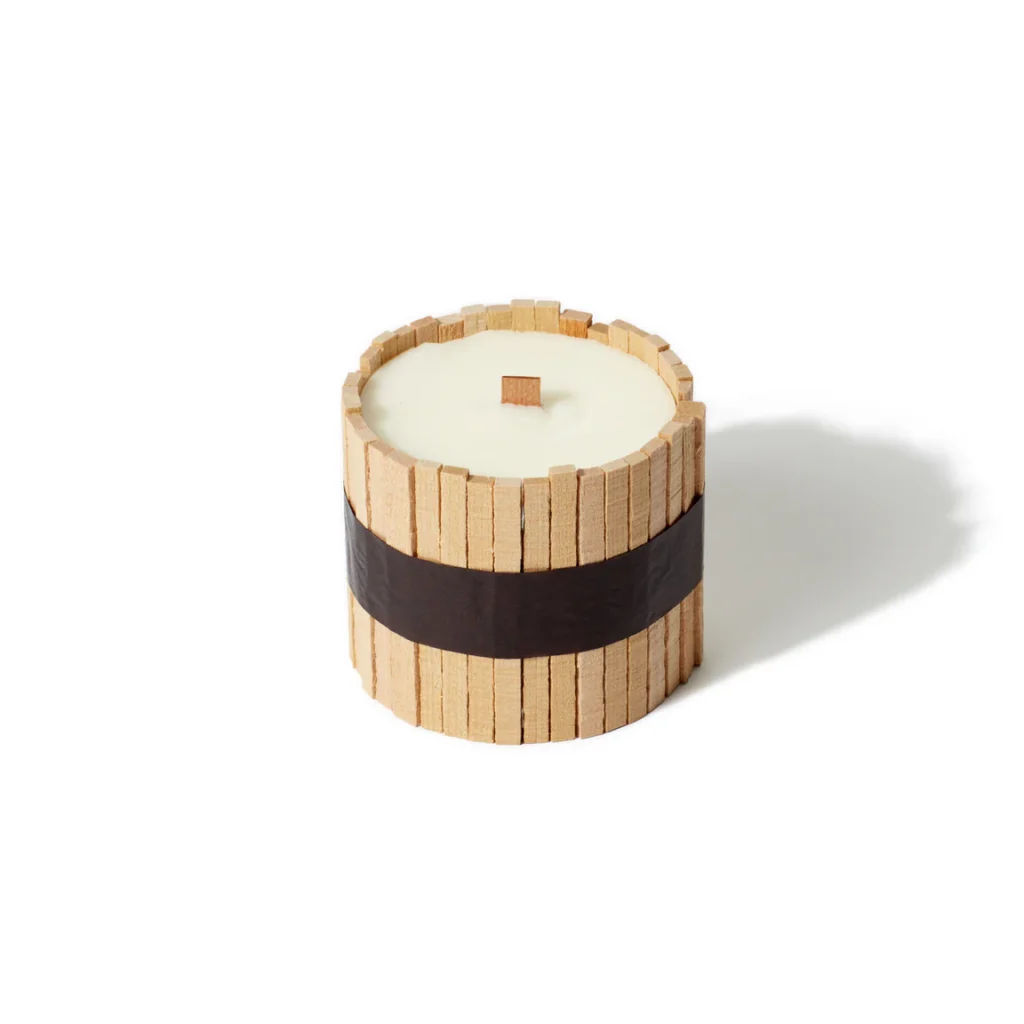
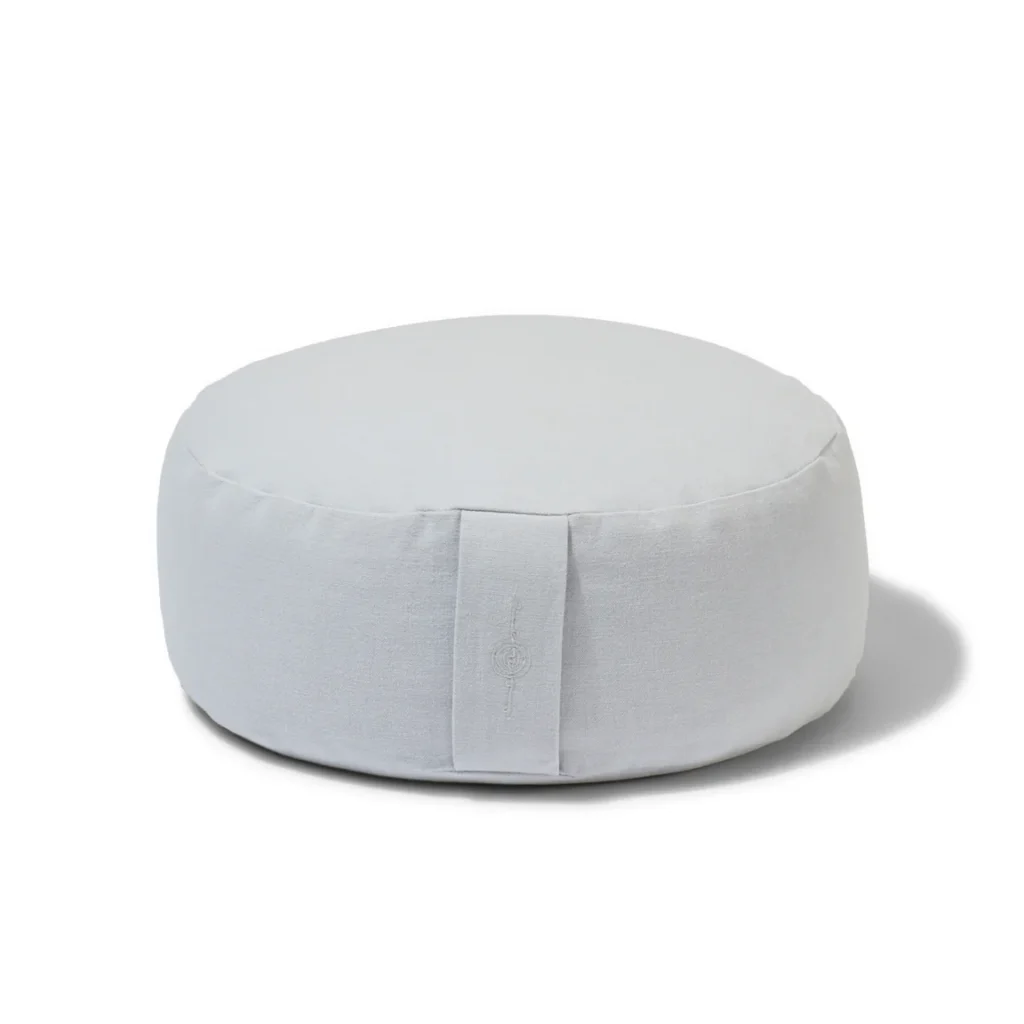
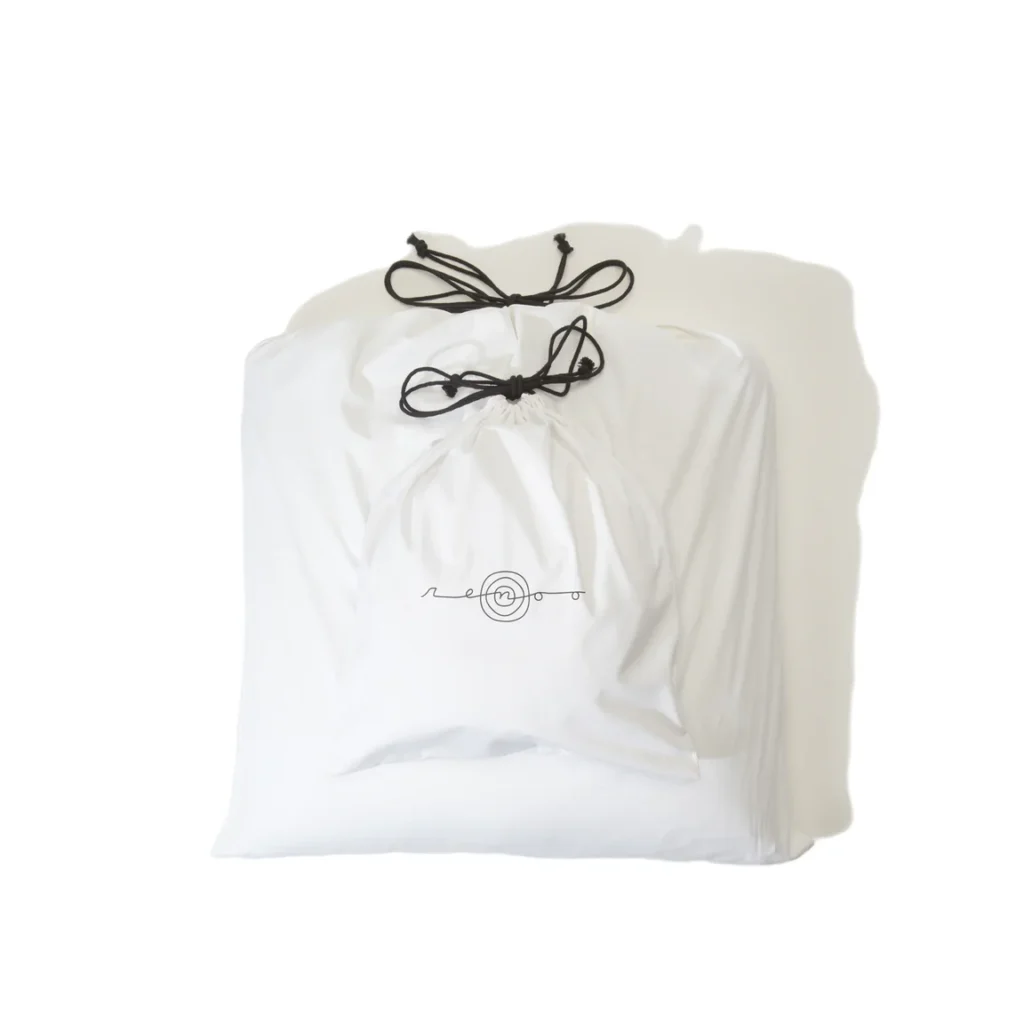
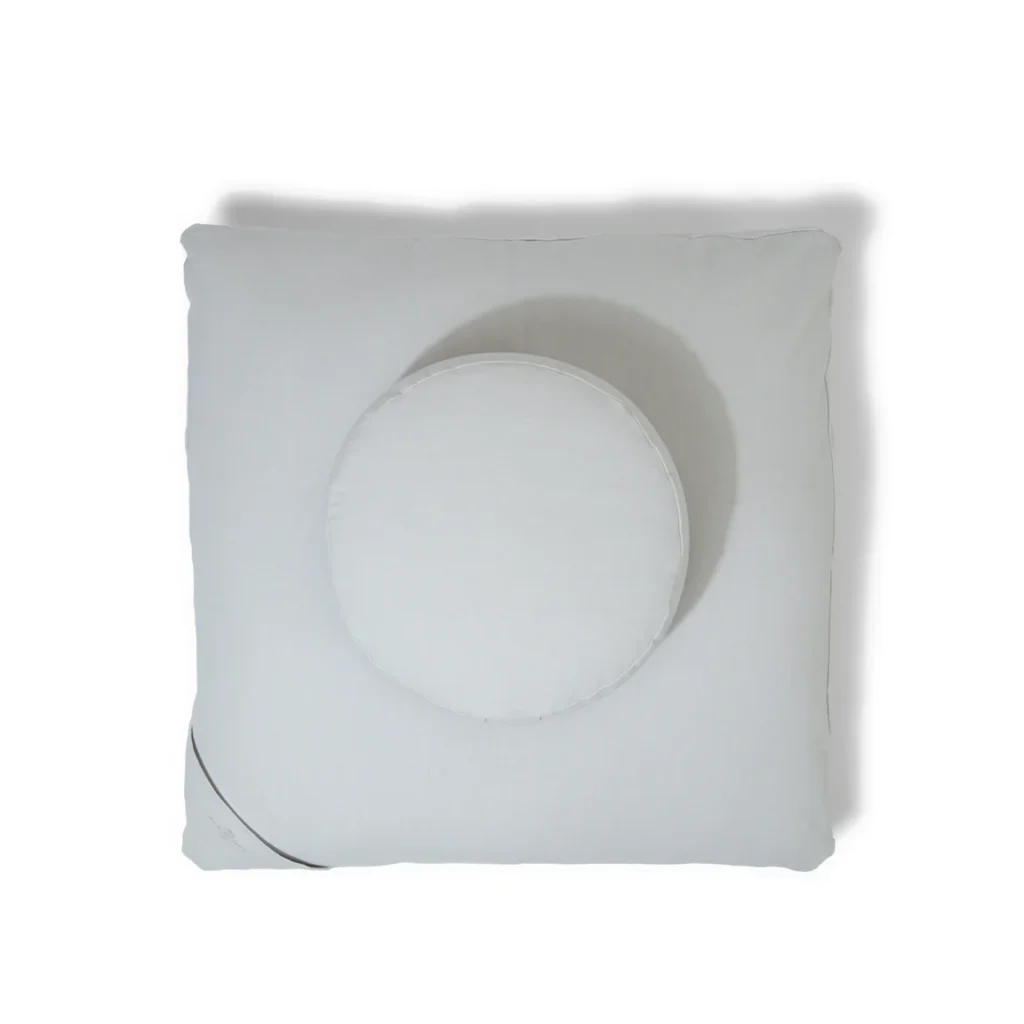
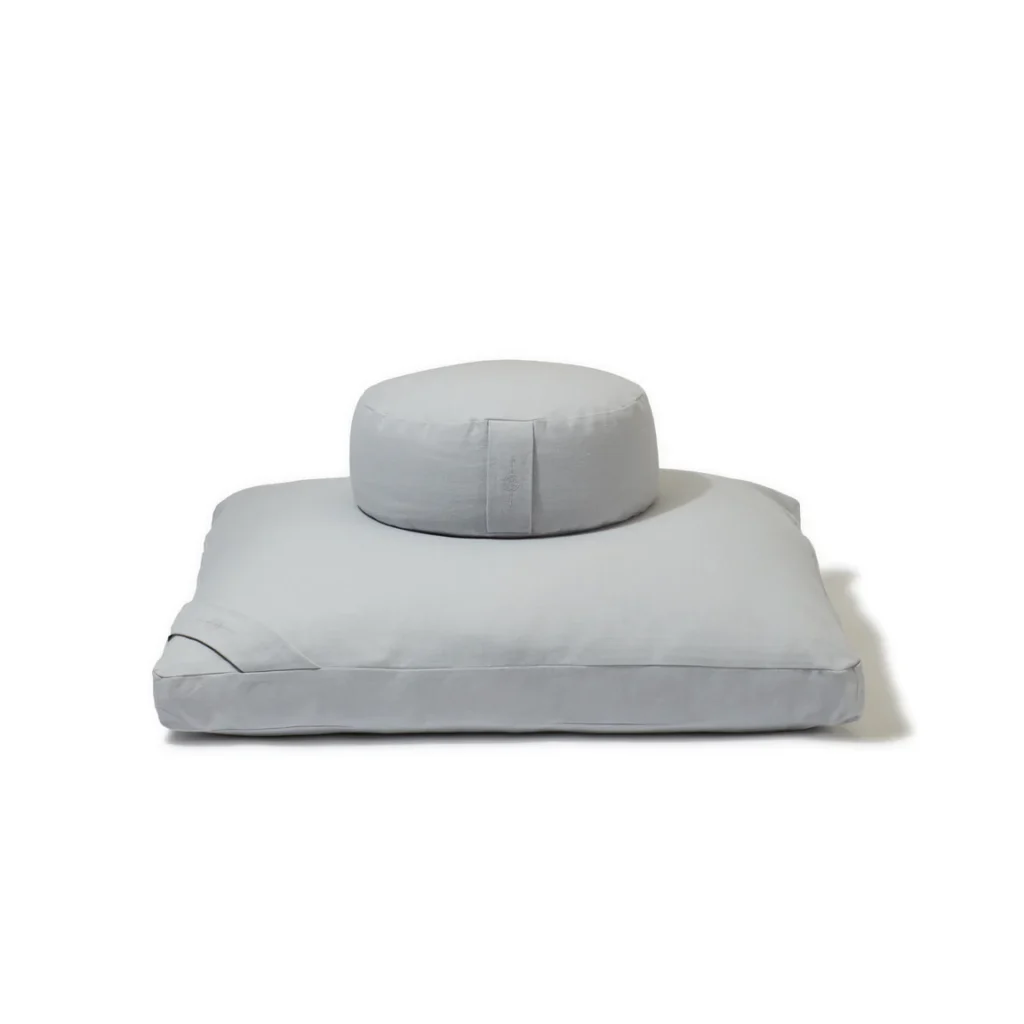
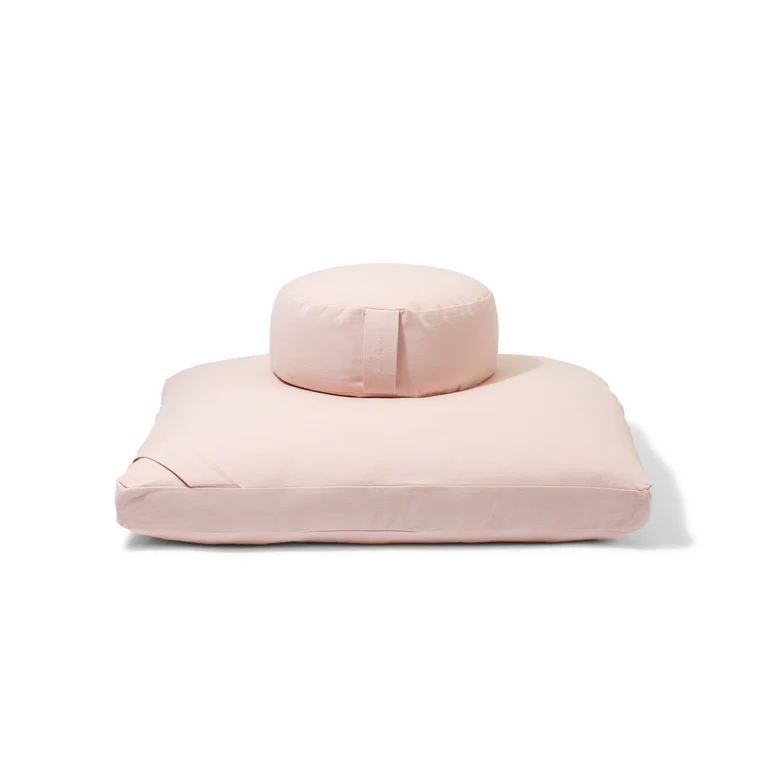
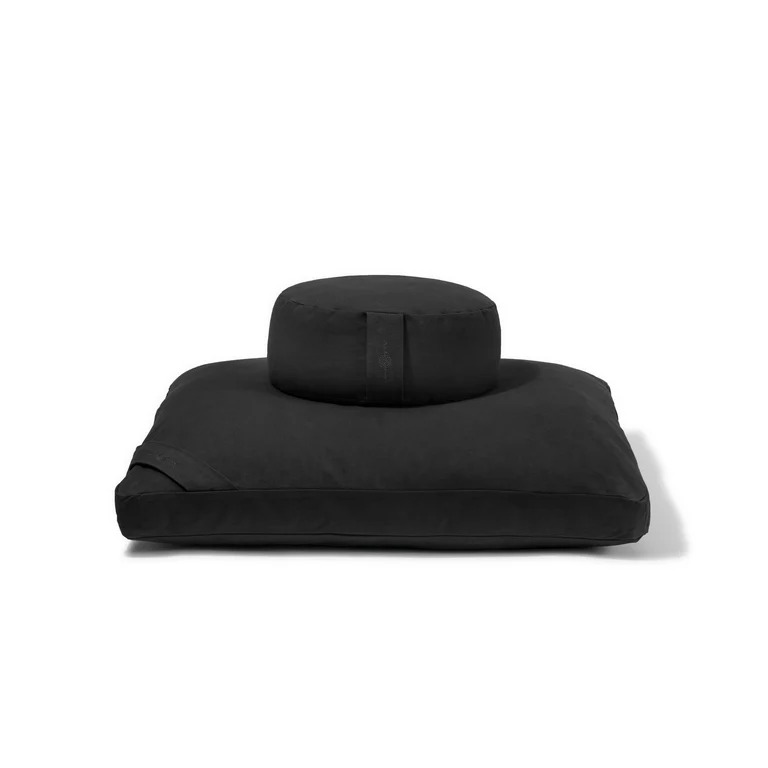
Among luxury mindfulness brands, Renoo stands apart through their integration of contemplative wisdom, sensory research, and sustainable craftsmanship. Rather than simply creating beautiful objects, each piece in their collection addresses specific aspects of practice:
The Foundation Collection: Embodied Stability
The base of any sustainable practice lies in physical comfort and stability. Renoo’s meditation cushions and benches incorporate:
- Ergonomic design based on studies of spinal alignment during extended sitting
- Proprietary filling blends that provide ideal support while adapting to individual anatomy
- Organic, sustainably harvested materials chosen for both ethical and sensory qualities
- Removable covers allowing for seasonal adaptation and longevity
The subtle but significant difference between adequate support and optimal support becomes increasingly apparent as practice deepens.
The Resonance Collection: Sound as Gateway
Sound meditation represents one of the most accessible entry points to contemplative practice. Renoo’s sound tools feature:
- Singing bowls crafted from seven-metal alloys with precise ratios for optimal resonance
- Mallets designed for specific tonal qualities with varying materials and weights
- Acoustic design that maximizes both felt and heard vibrations
- Hand-tuning by master craftspeople for specific frequencies aligned with traditional energy systems
The difference between mass-produced and precision-crafted sound tools becomes immediately apparent, even to beginners.
Watch this short video on an amazing sound healing I received.
The Aromatic Collection: Olfactory Anchors
Scent provides one of our most direct neural pathways to state change. Renoo’s aromatic offerings include:
- Incense created from wild-harvested resins through traditional methods
- Essential oil blends formulated specifically for different practices and intentions
- Diffusion tools designed for consistent, subtle release without synthetic carriers
- Seasonal aromatic collections that align practice with natural cycles
The purity of these materials creates cleaner, more effective sensory experiences than commercial alternatives containing fillers and synthetic components.
The Illumination Collection: Focused Presence
Light has served contemplative practice across traditions for millennia. Renoo’s lighting tools include:
- Candle holders designed for specific flame qualities and light patterns
- Materials selected for optimal light reflection and diffusion
- Proportions based on sacred geometry principles
- Hand-finished surfaces that develop unique characteristics with use
These thoughtful details transform ordinary lighting into contemplative tools that naturally draw and hold attention.
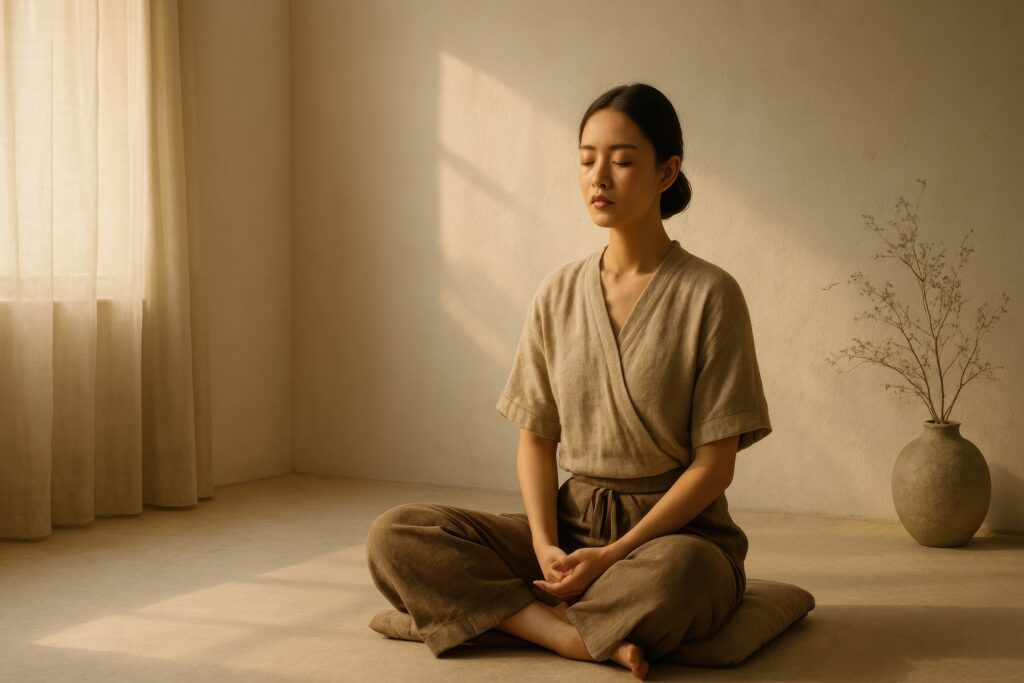
Creating Your Personal Practice Sanctuary
Rather than accumulating numerous tools, the mindful approach involves selecting fewer, more meaningful objects that truly support your specific practice:
Clarifying Your Core Practice
Begin by identifying your primary contemplative approach:
- Body-centered practices (yoga, somatic meditation, embodiment work)
- Awareness practices (mindfulness, vipassana, witnessing)
- Concentration practices (samatha, focused attention, mantra)
- Devotional practices (bhakti, prayer, ritual)
Different approaches benefit from different environmental supports.
Addressing Specific Challenges
Consider your personal obstacles to consistent practice:
- Physical discomfort or limitation
- Difficulty with focus or concentration
- Environmental distractions
- Motivational challenges
Thoughtfully chosen tools can directly address these specific obstacles.
Sensory Clarity
Assess your unique sensory preferences and sensitivities:
- Do certain textures reliably draw you into presence?
- Are there sounds that consistently support your settling?
- Which scents create a sense of sacred space for you?
- What visual elements help maintain gentle focus?
The most effective practice tools resonate with your individual sensory makeup.
Ritual Integration
Consider how tools might support transition into practice:
- Morning awakening rituals
- Transition moments between activities
- Evening unwinding sequences
- Dedicated practice periods
Strategic placement of practice tools creates environmental cues that support consistency.
The Question of Investment: Value Beyond Price
The consideration of luxury mindfulness tools inevitably raises questions about necessity and value. Several perspectives merit consideration:
Sustainability Calculus
Higher-quality tools typically offer significantly longer lifespans:
- A well-crafted meditation cushion may last 15+ years versus 2-3 years for mass-produced alternatives
- Precision-crafted singing bowls often become multi-generational objects
- Proper materials allow for repair rather than replacement
This longevity dramatically changes the actual cost-per-use calculation.
Practice Consistency Value
The most expensive practice tool is the one that goes unused. Tools that genuinely support consistent engagement offer value beyond their price:
- A cushion that allows for comfortable sitting for 30 minutes rather than 10 minutes
- A singing bowl that draws you into regular sound meditation
- An incense that reliably creates a sense of sacred space
The value of consistent practice compounds over time in ways difficult to quantify.
Ethical Production Consideration
Superior craftsmanship typically involves more ethical production methods:
- Fair compensation for skilled artisans
- Sustainable material sourcing
- Traditional techniques that preserve cultural heritage
- Reduced environmental impact through longevity
These considerations extend the benefit of your purchase beyond your personal practice.
Attention Investment Recognition
Perhaps most fundamentally, investing in quality practice tools represents an important psychological commitment:
- The objects we value receive more of our attention
- Financial investment often supports psychological investment
- Conscious choice of meaningful objects counteracts mindless consumption
This intentional approach to material objects itself becomes a form of practice.
Beginner’s Guide to Mindful Investment
For those new to contemplative practice or considering their first significant tools, here are guidelines for thoughtful selection:
Start with Foundation
The single most important investment for most practitioners is proper seating support:
- An ergonomically designed meditation cushion or bench
- Proper height and firmness for your unique body
- Materials that support comfort in your climate
- Design that integrates aesthetically with your space
Renoo’s Foundation Collection offers options specifically designed for different body types and practice styles.
Add One Sensory Anchor
After establishing physical support, consider which sensory pathway most effectively draws you into presence:
- A precision sound tool if auditory input centers you
- An aromatic element if scent reliably shifts your state
- A visual focal point if sight provides your strongest anchor
- A tactile object if touch grounds your awareness
The Renoo Elemental Collection provides options designed for specific sensory engagement.
Create Consistent Placement
Designate a specific location for your practice tools that:
- Remains visible as a regular reminder
- Allows for easy access when motivation arises
- Creates aesthetic harmony that invites engagement
- Minimizes set-up time for regular practice
The Renoo Sanctuary Set offers a complete solution for creating this dedicated space even in small living environments.
Conclusion: The Mindful Relationship with Objects
The Buddhist teaching of the Middle Way offers wisdom regarding our relationship with practice tools. Neither attachment to luxury nor rejection of material support represents the balanced path. Instead, we can develop a mindful relationship with carefully chosen objects that genuinely support our contemplative journey.
Quality mindfulness tools, thoughtfully selected and consciously used, become more than mere possessions. They evolve into relationship partners in our practice—reliable companions that hold space, provide feedback, and create conditions conducive to deepening awareness.
The Renoo collection embodies this philosophy through objects designed with genuine understanding of contemplative practice, crafted with intention, and offered in service of awakening rather than mere consumption. These aren’t luxury items for display but rather functional tools of exceptional quality that earn their place in your practice through daily use.
In a world filled with disposable alternatives and mindless acquisition, choosing fewer, better objects represents its own form of practice—a tangible expression of values that honors both the material world and the awareness that pervades it.
How has the quality of your practice tools affected your mindfulness journey? Share your experience in the comments below.
Explore the Renoo mindfulness collection and experience the difference that thoughtful design makes in your practice

Comments +
Elevated Awareness: Why Luxury Mindfulness Tools Deepen Your Practice
mindfulness